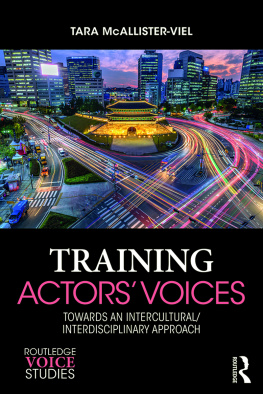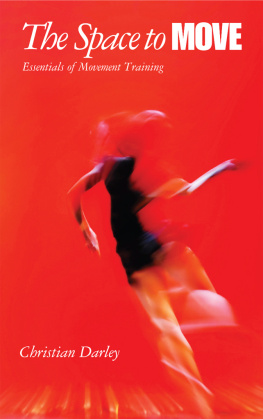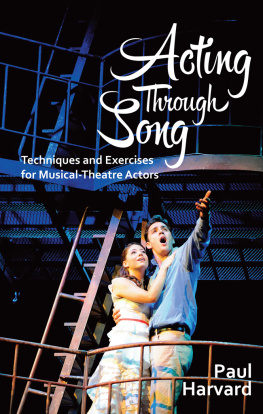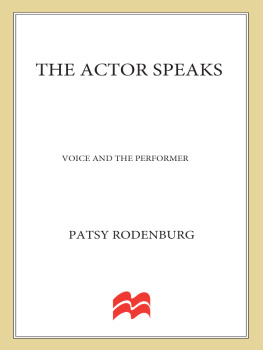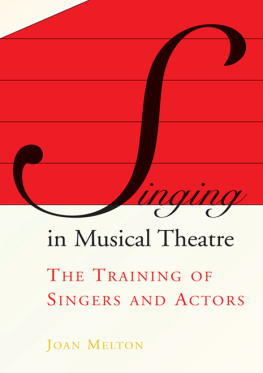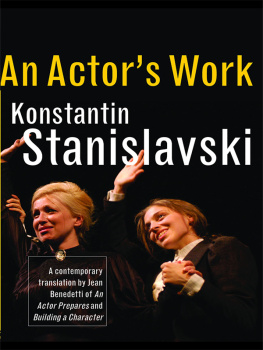
TRAINING ACTORS VOICES
Contemporary actor training in the US and UK has become increasingly multicultural and multilinguistic. Border-crossing, cross-cultural exchange in contemporary theatre practices, and the rise of the intercultural actor has meant that actor training today has been shaped by multiple modes of training and differing worldviews. How might mainstream Anglo-American voice training for actors address the needs of students who bring multiple worldviews into the training studio? When several vocal training traditions are learned simultaneously, how does this shift the way actors think, talk, and perform? How does this change the way actors understand what a voice is? What it can/should do? How it can/should do it?
Using adaptations of a traditional Korean vocal art, pansori, with adaptations of the natural or free voice approach, Tara McAllister-Viel offers an alternative approach to training actors voices by (re)considering the materials of training: breath, sound, presence, and text. This work contributes to ongoing discussions about the future of voice pedagogy in theatre, for those practitioners and scholars interested in performance studies, ethnomusicology, voice studies, and intercultural theories and practices.
Tara McAllister-Viel is Head of Voice and Speech at East 15 Acting School, UK.
Routledge Voice Studies
Series editors: Konstantinos Thomaidis and Ben Macpherson
https://www.routledge.com/Routledge-Voice-Studies/book-series/RVS
The Routledge Voice Studies series offers a platform for rigorous discussion of voice across disciplines, practices and areas of interest. This series aims to facilitate the dissemination and cross-fertilisation of voice-related research to effectively generate new knowledge and fresh critical insights on voice, vocality, and voicing.
Composing for Voice
A Guide for Composers, Singers, and Teachers
Paul Barker
Voice Studies
Critical Approaches to Process, Performance and Experience
By Konstantinos Thomaidis and Ben Macpherson
Training Actors Voices
Towards an Intercultural/Interdisciplinary Approach
Tara McAllister-Viel
First published 2019
by Routledge
2 Park Square, Milton Park, Abingdon, Oxon OX14 4RN
and by Routledge
711 Third Avenue, New York, NY 10017
Routledge is an imprint of the Taylor & Francis Group, an informa business
2019 Tara McAllister-Viel
The right of Tara McAllister-Viel to be identified as author of this work has been asserted by her in accordance with sections 77 and 78 of the Copyright, Designs and Patents Act 1988.
All rights reserved. No part of this book may be reprinted or reproduced or utilised in any form or by any electronic, mechanical, or other means, now known or hereafter invented, including photocopying and recording, or in any information storage or retrieval system, without permission in writing from the publishers.
Trademark notice: Product or corporate names may be trademarks or registered trademarks, and are used only for identification and explanation without intent to infringe.
British Library Cataloguing-in-Publication Data
A catalogue record for this book is available from the British Library
Library of Congress Cataloging-in-Publication Data
Names: McAllister-Viel, Tara, author.
Title: Training actors voices: towards an intercultural/interdisciplinary approach.
Description: Abingdon, Oxon; New York, NY: Routledge, 2018. | Includes bibliographical references and index.
Identifiers: LCCN 2018008811| ISBN 9781138088689 (hardback: alk. paper) | ISBN 9781138088696 (paperback: alk. paper) | ISBN 9781315109718 (ebook)
Subjects: LCSH: Voice culture. | Voice cultureKorea (South) | Pansori.
Classification: LCC PN2071.S65 M45 2003 | DDC 792.028dc23
LC record available at https://lccn.loc.gov/2018008811
ISBN: 978-1-138-08868-9 (hbk)
ISBN: 978-1-138-08869-6 (pbk)
ISBN: 978-1-315-10971-8 (ebk)
Typeset in Bembo
by Sunrise Setting Ltd, Brixham, UK
This book is lovingly dedicated to my children
Tilly, Plen, and Mae
Mi vida, mi alma, mi corazn.
CONTENTS
I would like to gratefully acknowledge those who gave of their time and talents to make the work documented here possible.
First, this monograph was written with the generous support of the International Research Center, Interweaving Performance Cultures, Freie Universitt-Berlin, Germany, Research Fellowship 20152016. Thank you to Erika Fischer-Lichte, Gabriele Brandstetter, Matthias Warstat, and Christel Weiler for inviting me to the IRC and for your invaluable feedback during the writing of this monograph. Thank you to Torsten Jost for our conversations that shaped and for your practical support throughout my time in Berlin. Thank you to Holgar Hartung for your support and attention to every detail.
To my students in South Korea and Great Britain: Thank you for your patience, kindness, and trust. Your hard work and honest feedback have shaped this research and guided me as a teacher.
To my teachers: I am particularly grateful to Phillip Zarrilli for your continued support over the past 30 years. To Karen Ryker, for nurturing my work well beyond graduate school. To the loving memory of my first pansori teacher, Han Nongsn, who treated me with such kindness. I have been humbled by the patience, support, and generosity of my second pansori sonsaengnim, Sng Uhyang. I am also deeply indebted to Bae Il-dong and Seo Suk-Ja, who helped me learn when I struggled most. To Chan Park, who graciously took me into her home to teach me and whose research and writing have guided my own work from the beginning.
I would also like to thank the master teachers who graciously welcomed me into their classrooms and gave me the gift of their knowledge in training and interviews: Ahn Sook-son, Chong Hoi Suk, Choi Yoon-Cho, Choi Young-Ai, Cicely Berry, Kristin Linklater, and Patsy Rodenburg. I would also like to thank Moon Seung-Jae for his shared enthusiasm for this work. I am guided by the ethnographic research of Um Hae-kyung and Heather Willoughby, whose work as practitioners, scholars, and researchers have directed my focus and whose supportive e-mails have encouraged me.
My tremendous appreciation for translation assistance: To my friend and in-class translator of four years at KNUA, the talented Park Mi-kyung, who taught me to look behind the mountain. To my friend, colleague, and in-class translator at KNUA in 2001, Lee Yu-Kyung, who was never too busy to offer the gift of her time. To my good friend and colleague, Hwang Ha-Young, an incredible scholar, and her brother Hwang Il-Suk, for onsite translation at Namdaemun Market, and the loving support of their parents. To my good friend and colleague, Yoo Jeung-Sook, for support as in-class translator for the 2003 Summer workshop at KNUA and for the pleasure of working together at East 15. To my friend Ahreum Han for helping me decipher dialects through street noise on audio samples. And Park Young Hoon for translation during conference lectures and workshops, chasing permissions, and your support over the course of 18 years.
To my colleagues at The Korean National University of Arts, School of Drama, especially the love and support of my long-time friend, Professor Kim Soogi, who trained with me under Phillip Zarrilli so many years ago at the Asian/Experimental Theatre Program, University of Wisconsin-Madison.
To my friends and colleagues at The Royal Central School of Speech and Drama and East 15 Acting School for your support and feedback while developing voice curriculum for both institutions.
Next page
